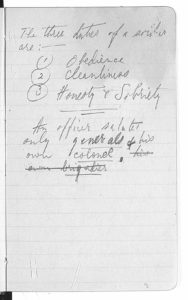Friday Feb 22nd, 1918
Second relief AB14. Cold cruel – cannot feel my feet at all. Up to knees in water some places. Sold my rum issue. Stand down. Breakfast and down to it after work or supposed work 2pm but dodged it. Tea poor. Stand too 6:15 . First relief AB14. Still awful cold. Wonder how we stand it at all.
Duty in the Trenches
Frank sounds cold and miserable. Standing for hours on end in the wet trenches, trying not to move or do anything that will attract the enemy’s attention, must have been nerve racking and physically hard to take. Frank’s diary entry makes it sound both boring and frightening in equal measure. It is unclear how he ‘dodged’ the work at 2pm – but that and his comment (similar to yesterday’s) ‘Wonder how we stand it all.’ give a sense of his mood.
Frank, to some extent, has been lucky to this point. Whilst obviously in danger, he has not yet participated in an offensive. Some of these, particularly on the Western Front, must have been brutal. Which begs the question, how did soldiers put up with it all?
Military Discipline

In an article, Gary Sheffield posited that it was ‘military discipline’, which, ‘…makes the difference between a mob and an army. It is a form of behaviour that is the consequence of training and indoctrination, designed to ensure compliance to orders among individuals and groups, to create and maintain cohesion in military units.’¹
Along similar lines, this photograph shows the notes of Roland Gerard Garvin, written while he was undergoing military training in Chelsea in 1914. He records the three duties of a soldier as: ‘obedience’, ‘cleanliness’ and ‘honesty & sobriety’. *
Sheffield also drew parallels between industrial and military discipline: ‘Germany and Britain, for example, were highly industrialised and urbanised societies in 1914. All working-class soldiers would have been used to being at the bottom of society, with all that entailed. Even so, all armies subjected new recruits to basic training which ranged from the unpleasant to the brutal, the aim being to break down the individuality of the new soldiers and to mould them into a group that would carry out orders unquestioningly.’¹
As a lay-person, I hope there is more to it than that. I would like to think that values of camaraderie, cause (however spun) and country play some role. This is somewhat borne out by Roland Garvin, who also kept a diary. His entry for Tuesday 4th July 1916 includes: ‘See [Sumley] in afternoon; “a splendid scrap”. Men cheerful and fighting well. Bad losses.’ Captain Garvin was killed just weeks after he wrote this entry during the Somme Offensive.²
13th (Service) Battalion War Diary – 22nd February 1918 – No 1 Sector, Minden Camp
Both artilleries fairly quiet on the whole. Our 18 pounders fired on a working party on the Pill Box at 18:05 hrs, machine guns cooperating. 17:15 enemy plane overhead our lines was engaged by one of ours. After a short fight ours turned and flew south, the enemy plane returning to its own lines. Our sniper retaliated on enemy snipers in O1. New work is visible about 25 yds north west of the Pill Box in O2. 18:45 movement near the Pill Box was fired on by our 18 pounders and machine guns. 2 OR struck off effective strength under GRO 1011 with effect from 20-2-18 and 5 from 22-2-18. 7 OR having rejoined are again taken off from 21-2-18. A reinforcement of 70 OR having joined is taken on from 21-2-18.
References & Further Reading
¹ ‘Military Discipline and Punishment‘ by Gary Sheffield, The British Library
* image and information copyright of the Garvin archive. The British Library MS88882/9/18
² extracts from diary of Gerard Roland Garvin in The British Library


